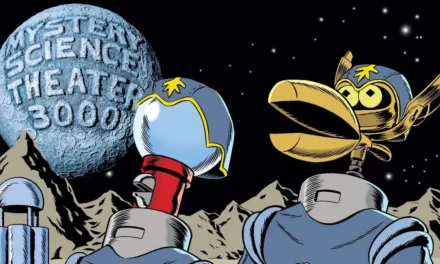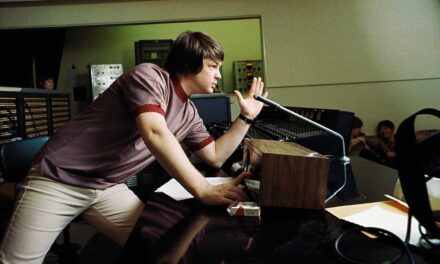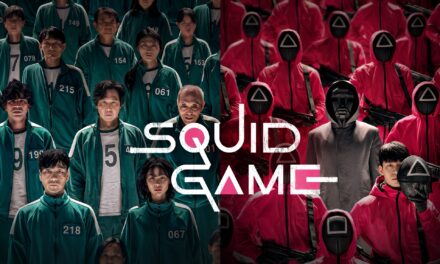What happens when one of history’s most feared villains meets a comparative innocent looking to enter the same line of work? In many cases, this scenario is used in media to illustrate the corruption and making of monsters. In Our Flag Means Death (HBO Max 2022-), however, it becomes a love story that not only deconstructs and humanises the ‘monster’ but turns the lens back onto capitalism, corporate cultures and systemic oppressions which make and unmake the people caught within it.
For those who have not seen the series, it follows historical figure Stede Bonnet (Rhys Darby), an aristocrat who chooses to leave his unhappy married life for a life of piracy as the ‘Gentleman Pirate.’ His crew are the expected motley bunch, but are all not only given depth but include an explicitly same-gender couple (Lucius, played by Nathan Foad and Black Pete, played by Matthew Maher), a non-binary character (Jim, played by Vico Ortiz) in a relationship with a cis-gender man (Oluwande, played by Samson Kayo), discussions that imply that there is a great deal of same-gender sex taking place at sea (though not necessarily in the context of relationships) and several Black men who are explicitly pirates because they have no other option as the series takes place pre-abolition. The series engages in postcolonial critique enjoined with capitalist critique, especially with regard to masculinity and management, which is what I shall discuss in more depth in this blog.
https://youtube.com/watch?v=xFE8ASwxmpA
Trailer for Our Flag Means Death, British readers can watch the series here.
Stede is, to put it kindly, not a great success as a pirate until 1.3 in which he– and we– properly meet Edward Teach, better known as Blackbeard (Taika Waititi). Like Stede, Ed is having a life crisis when we meet him, having become bored and jaded to the point of considering death. After saving Stede’s life, Ed initially hatches a plan with his first mate, Izzy Hands (Con O’Neill), to fake his own death by killing Stede. This plan becomes derailed over the course of the next several episodes as Ed becomes Stede’s mentor and, in so doing, they fall in love. This romantic aspect is omnipresent within the series with regard to character development and interaction, but in this blog I will turn to how the series uses it to critique corporate culture.[1]
The series frames its piracy in economic terms as well as sociocultural ones. Stede is referred to from the outset in 1.1 as ‘current management’ and the fact that he pays his crew a regular wage rather than a cut of whatever they acquire in raids is considered unusual. The crew are generally treated well rather than abused and activities that are ‘fun’ (e.g., recreation) or perceived as somehow unmasculine (e.g., sewing flags) are included as part of his management style. These are connected with Stede initially as being ‘weak;’ i.e., unable to fight, though his compassion does ultimately lead to greater loyalty. It is the contrast to Ed’s initial management style, which ostensibly embraces toxic masculinity, which illustrates the corporate critique (amongst other things).
Toxic masculinity is somewhat poorly or nebulously defined and overlaps to some degree with hegemonic masculinity (i.e., a hierarchy of masculinities, Connell and Messerschmidt, 2005) but a good summary is given by Sculos (2017):
…generally ‘toxic masculinity’ is used to refer to a loosely interrelated collection of norms, beliefs, and behaviors associated with masculinity, which are harmful to women, men, children, and society more broadly. […] Norms, beliefs, and behaviors often associated with toxic masculinity include: hyper-competitiveness, individualistic self-sufficiency… in a parochial patriarchal sense of the male role as breadwinner and autocrat of the family… a tendency towards or glorification of violence…chauvinism… sexism… misogyny… rigid conceptions of sexual/gender identity and roles, heteronormativity…
This, then, exists in tension with queer masculinity/-ties in the corporate environment (Roberts 2011) particularly with regard to management or other forms of command, something the series explicitly conflates. ‘Queer’ here refers both to orientation and follows Alexander’s (2021: 109) definition as that which challenges hegemonic/toxic masculinity. Because the series is a romantic comedy, the tension between the queer and toxic masculinities is primarily illustrated in the developing relationship between Stede and Ed and the impacts this has, particularly on Ed.
When we meet Blackbeard, he and Ed are discussed almost as if they are separate entities, including by Ed himself; Blackbeard is the myth/projection and Ed is the real human. This tension is illustrated further through the series as Ed falls in love with Stede but is shown to be a pre-existing part of his character. The mythical Blackbeard is an unrepentant murderer many times over. In reality, Ed killed his abusive father and, in 1.7 shows great remorse over it; as such he has not directly killed since that time (though he has arranged matters so that people would die, e.g., setting a ship on fire). The plot to kill Stede and, in so doing, fake his own death, reinforces what the identity crisis implies, that Ed no longer wants to be Blackbeard. The ‘fuckery,’ as Ed calls it, or the use of the myth of Blackbeard’s monstrosity and attendant deception to get other crews to surrender without (much of) a fight can also imply that Ed is trying to minimise casualties, though in such a way as to make the opposite appear to be the case. Ed’s humanity is, in essence, being hidden by Blackbeard’s (perceived) brutality or, to put it another way, his queer masculinity is hidden behind the masque of toxic masculinity (cf Alexander 2022: 102, on the ‘restrictive emotionality’ of straight-acting men). This type of concealment is not uncommon for closeted men in the workplace (Roberts 2011: 673-4) but in OFMD it is not the physical act of sex between people of the same gender but the emotional aspects of a relationship which are viewed negatively by Izzy and, by extension, the typical pirate/management environment.
Both Ed and Stede characterise their relationship as being friends; though they share a kiss and it is clearly a romantic relationship, the series is careful to differentiate between physical relationships– which are not stigmatised, regardless of the genders involved– and emotional relationships, which are strongly stigmatised. Thus there is a variation on the concept of queer masculinity in that the queer aspect is in the emotion, not the physical action. This can be tied back to Sculos’ (2017) definition of toxic masculinity above: toxic masculinity demands total dominance, usually through literal or metaphorical violence. This can be brought into combination with Alexander (2022: 102) on rigid gender roles (cf Sculos 2017) requiring certain types of performative masculinity, which devalue and deride emotion as weakness. Thus, Ed’s exposure to and falling in reciprocated love with Stede, who is comparatively innocent, causes Ed to openly reject toxic masculinity and instead reacquaint himself with his own humanity. This causes Izzy– who genuinely believes that love and humanity are destroying the man he serves: Blackbeard, not Edward– to view Ed as weak and a shell of who he was, yet again espousing this toxically masculine view of command.
Thus the conflicts come in part from Ed’s identity crisis, in part from his belief that he is a bad person (1.7) and in part from Izzy, representing the norms of the pirate workplace. Izzy’s place in the narrative offers another perspective on toxic masculinity, one which is not necessarily incompatible with emotion– it is unclear if Izzy is in love with Blackbeard but he clearly cares for him– and one which, though not positioned as correct, is made understandable to the audience by the production team. Izzy is an antagonist but not a caricature and that genuine emotional connection makes it understandable why Ed first returns to the ship (1.9) and then why he ultimately returns to his old ways.
At the end of series 1, heartbroken that Stede did not join him on their escape from what is effectively a reform school,[2] Ed first tries to deal with his depression through creative writing but, when that fails, he in essence leaves Stede for Blackbeard and becomes the monster once again. He pushes Lucius overboard and maroons the majority of Stede’s crew save Jim and Frenchie (Joel Fry) who he believes are useful. Though there is a brief shot of Ed sobbing in Stede’s former room, the final illustration of Blackbeard’s return is in the flag he has Frenchie sew for the ship he has now taken from Stede: a demonic figure with a spear stabbing a heart. It is unclear as of the time of writing how (or if) the emotional connection between Ed and Stede will counter this toxicity in any of the ways in which queer masculinity can (cf Beattie, forthcoming).
When writing of organisational theory, Cunliffe (2022) asks ‘Must I grow a pair of balls to theorize about theory in organization and management studies?’ in her title. She then discusses the false binaries of man:woman and reason:emotion and the false linkages of those binaries (i.e., man:reason/woman:emotion) with regard to how corporate cultures are conceived and perceived. We see this, and the critique of the false binaries, in how both Ed and Stede’s management styles are contrasted, developed and positioned over the course of the series. Stede is ultimately strengthened by love, and his management style also expresses that. He continues to see his crew, including Ed, as human beings who deserve fair treatment and protection. Ed’s management style moves from Blackbeard’s cruel tyranny to also viewing Stede and his crew as people and then, due to his heartbreak, Ed is once again subsumed by Blackbeard (at least in public). The Ed/Blackbeard dichotomy illustrates the tension between toxic and queer masculinities in the workplace as well as how monsters are made and unmade from human beings. Unsurprisingly, as the series shows, the making of monsters and these tensions are not unconnected, leading to a toxic workplace and a captain in crisis. Bring on series 2.
Dr Melissa Beattie is a recovering Classicist who was awarded a PhD in Theatre, Film and TV Studies from Aberystwyth University where she studied Torchwood and national identity through fan/audience research as well as textual analysis. She has published and presented several papers relating to transnational television, audience research and/or national identity. She is currently an Assistant Professor of Communication (Ambassador’s Distinguished Scholars Programme Fellow) at Bahir Dar University in Ethiopia and will be joining the American University of Phnom Penh in August 2023 as an Assistant Professor of English/Humanities. She has previously worked at universities in the US, Korea, Pakistan and Armenia. She can be contacted at tritogeneia@aol.com.
References
Alexander B K (2022) Queer(y)ing masculinities: Revisited. In Cooper L R (ed). The Routledge Companion to Masculinity in American Literature And Culture. London: Routledge, pp. 93-118.
Beattie M (Forthcoming) ‘I’d castrate you and marry you in a heartbeat’: Queerness, quality and Classics in Succession. Northern Lights: Film & Media Studies Yearbook.
Connell R W and Messerschmidt J W (2005) Hegemonic masculinity: Rethinking the concept. Gender and Society. 19(6): 829-859.
Cunliffe A L (2022) Must I grow a pair of balls to theorize about theory in organization and management studies?. Organization Theory. 3: 1–28.
Roberts S (2011) Exploring how gay men manage their social identities in the workplace. Equality, Diversity and Inclusion: An International Journal. 30(8): 668-685.
Sculos B W (2017) Who’s afraid of ‘Toxic Masculinity’?. Class, Race and Corporate Power. 5(3): n.p.
Footnotes
[1] I discuss this with regard to Succession (HBO/Sky 2017-2023) in a forthcoming paper; Succession and OFMD are connected through What We Do in the Shadows (FX 2019-present) where Taika Waititi is a co-creator and executive producer and Jesse Armstrong of Succession is an executive consultant.
[2] Over the course of the series, Stede was indirectly involved in the deaths of twin naval officers Captain and Admiral Badminton (Rory Kinnear). Haunted by hallucinations of the captain and then witnessing the admiral’s death from an accidental, self-inflicted gunshot wound, Stede tried to return to his civilian life– abandoning Ed in the process– and failed to thrive. By the end of 1.10 he has chosen to take to the seas once again, having faked his own death (cf Ed’s desire to do so as described elsewhere).





